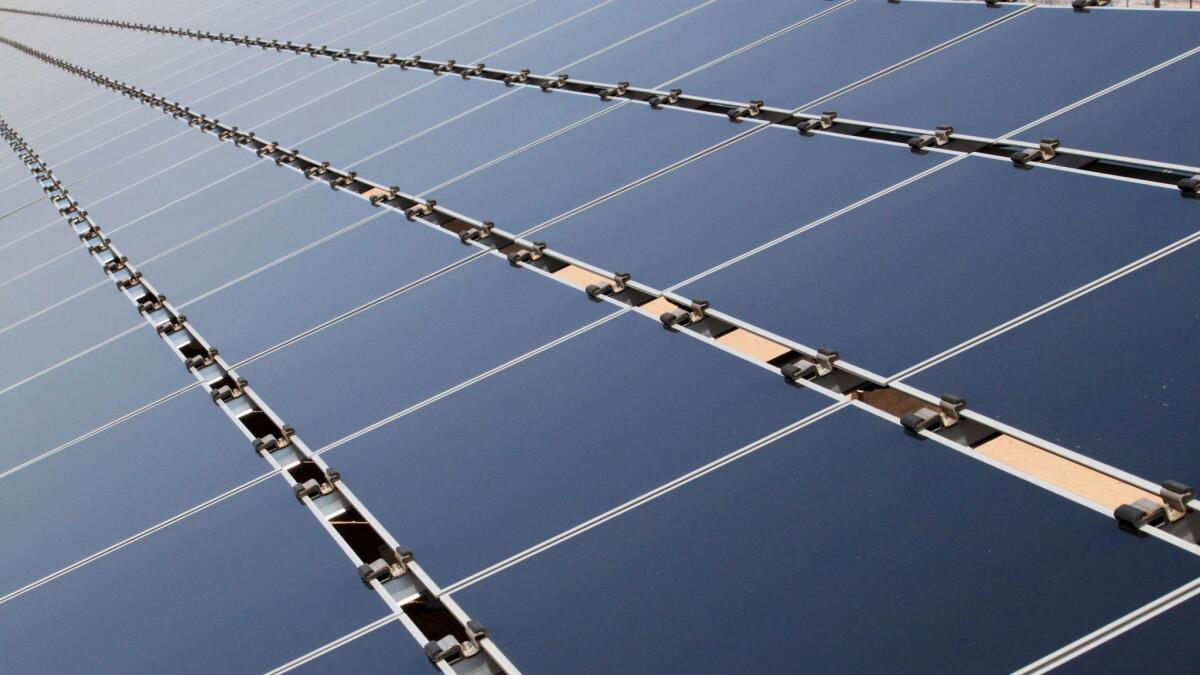Opinion: President Trump finally gets his wish to slap tariffs on China, American consumers be damned

This is what protectionism looks like: “On January 22, 2018, U.S. Trade Representative Robert Lighthizer announced that President Trump has approved recommendations to provide relief to U.S. manufacturers and impose safeguard tariffs on imported residential washing machines and solar cells and modules, based on the investigations, findings, and recommendations of the independent, bipartisan U.S. International Trade Commission.”
Those words come from a news release issued Monday by Lighthizer’s office, announcing tariffs of up to 30% on imported solar cells and a stunning 50% on imported washing machines, regardless of where they were made outside the United States. The sanctions were based on a U.S. law designed to protect domestic manufacturers whose sales go down sharply in the face of foreign competition.
Here’s the problem. Contrary to international trade agreements, the law doesn’t require domestic manufacturers to show that their competitors were competing unfairly, or even that the threat to domestic production could harm national security. It merely requires them to show that the imports were a substantial cause of serious injury.
If the president wants to undermine U.S. growth, he should keep slapping blanket tariffs on imports and making Americans pay more for the goods they buy.
Appliance giant Whirlpool, which brought the washing machine case, and Suniva and SolarWorld, the struggling companies behind the solar cell complaint, argue that they have indeed been subject to unfair competition by South Korean and Chinese companies, respectively. They also contend that their competitors have shifted production from country to country to dodge more conventional sanctions for their unfair practices.
Even if they’re right, though, the law they’re using is the sort of unvarnished protectionism the United States should have abandoned decades ago. Just because U.S. producers of a good are being hammered by foreign competition, that doesn’t mean U.S. consumers should be taxed to help them stay in business. And that’s what tariffs (and quotas) are: taxes on consumers for the benefit of companies that are having trouble competing.
That’s not to say tariffs and quotas have no place — they do. However, it’s one thing to impose tariffs to help specific companies being injured by specific competitors’ unlawful trade practices. It’s another to impose blanket penalties on all foreign companies in a product line for the sake of every domestic manufacturer of that product simply because one or two of those manufacturers can show its sales are being pummeled.
No offense to Whirlpool, Suniva and SolarWorld, but they are just small pieces of the big U.S. economic puzzle. Raising tariffs on imported solar cells by 30% in the first year (exempting the first 2.5 gigawatts’ worth of cells imported) will have a ripple effect on multiple interests, including solar power installers and homeowners and businesses that want to shift to solar, while slowing the shift from fossil fuels to renewable energy. Similarly, the tariffs and quotas on imported washers will hit appliance retailers, parts suppliers, installers and repair shops, and just about any individual or business buying a new washing machine.
Trump, who pledged during his campaign to get tough on our trade partners, has fixated on the U.S. trade deficit as being bad for Americans. But the trade deficit isn’t like a budget deficit, which represents borrowing against the future. It’s a measure of comparative advantage — how much more efficient producers of a good in one country are than their trading partners — and of buying power and economic strength. One reason we have a huge trade deficit with China is because we can afford to buy much more of what they produce than they can afford to buy from us. And that’s not necessarily a bad thing.
If the president wants to undermine the growth he’s trying to promote with that giant GOP tax cut, he should keep slapping blanket tariffs on imports and making his constituents pay more for the goods they buy. Perhaps he’ll save a few manufacturing jobs in the process, but that will come at the cost of jobs in other industries and consumers’ pocketbooks. And that’s before you factor in the consequences of our trading partners imposing retaliatory tariffs and quotas on our imports.
Twitter: @jcahealey
More to Read
A cure for the common opinion
Get thought-provoking perspectives with our weekly newsletter.
You may occasionally receive promotional content from the Los Angeles Times.






